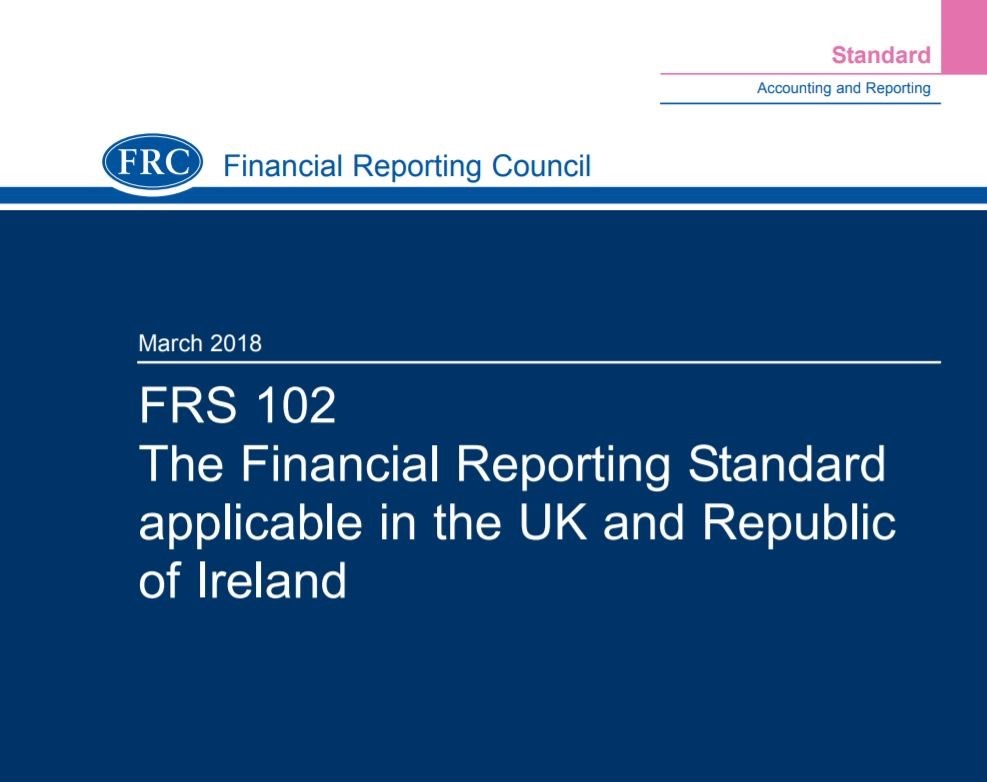
by John McCarthy Consulting Ltd. | Apr 15, 2019 | Blog, News
FRS 102.29 permits entities to discount the cash flow impact of deferred taxation as the liability to pay may not arise for many years into the future. True or False?
Well the answer is ‘False’. The amortisation of deferred tax is not permitted under FRS 102 (‘an entity shall not discount current or deferred tax assets and liabilities’ FRS 102.29.17).
For other challenging quiz questions, go see our online webinar on Accounting for Deferred Tax, and download the slides and support materials, all for just €45. On successful completion, receive a CPD certificate for your newly acquired knowledge. Well done!
The online webinar deals with the following areas of deferred tax (DT) accounting:
- The basic requirements of FRS 102.19 – the five main areas where DT provisions arise;
- Revaluations and how they trigger DT provisions;
- Share-based payments that cause DT provisions;
- Groups;
- Undistributed profits;
- Defined benefit schemes;
- Deferred Tax Assets;
- Disclosures;
There are 18 other webinars on various topics – also for €45 each, or you may purchase two at the same time for €80 or 5 for €190.
All our webinars are accessible at any time (for 12 months from date of purchase) here.
Last week’s blog on Audit Exemption proved very popular and in case you missed it, here is the link to the relevant webinar again. Corresponding with the Audit Exemption webinar, we have prepared, ready to use, audit exemption engagement and representation letters (in Word format) available to purchase online (bulk purchases of 5 or more templates attract a 20% discount), please click on the relevant links:

by John McCarthy Consulting Ltd. | Apr 7, 2019 | Blog, News
Is the following statement True or False? The exemption thresholds for audit exemption changed with effect from 21 September 2018 when the Companies (Statutory Audits) Act, 2018 came into effect.
In our webinar entitled ‘Audit Exemption – What are the New Rules?’, we cover the main changes brought about since the advent of the Companies Act, 2014 including:
- The new thresholds for ‘small’ companies and certain ‘small’ groups
- Changes since 21 September 2018?
- Miscellaneous Technical Statement 41 on compilation assignments
- Engagement/representation letters – suitable audit exemption templates available on our website here
- Procedures and Planning
- Accountant’s report
- Resignation issues and voluntary audit
For the answer to the quiz question above and other similar questions on the Audit Exemption, go to our website and download the webinar on this topic for just €45. On successful completion, receive a CPD certificate for your newly acquired knowledge. Well done!
There are 18 other webinars on various topics – also for €45 each, or you may purchase two at the same time for €80 or 5 for €190.
All our webinars are accessible at any time (for 12 months from date of purchase) here.
For the following, ready to use, audit exemption engagement and representation letters (in Word) available to purchase online (bulk purchases of 5 or ore templates attract a 20% discount), please click on the relevant links:

by John McCarthy Consulting Ltd. | Sep 2, 2016 | News
Since the implementation of the new Companies Act, 2014 on 1 June 2015, the financial statements of regulated insurance intermediaries and investment brokers will no longer qualify for certain exemptions.
Those affected are those carrying on business under the Insurance Act, 1989 or otherwise authorised by the Central Bank. The full list of entities affected is on the 5th Schedule of the Companies Act, 2014
This applies to financial statements approved by the directors on/after 1 June 2015 and means they:
1. Are not allowed to qualify for the ‘small’ or ‘medium’ thresholds as defined in company law;
2. Cannot abridge their financial statements. They must file full accounts with the CRO;
3. Cannot avail of audit exemption;
4. Cannot avail of the FRSSE (the Financial Reporting Standard for Smaller Entities (January 2015);
5. Must apply FRS 102 in full with effect from financial years commencing on/after 1 January 2015 (including a compulsory cash flow statement);
6. Must disclose auditor remuneration in the four categories required by section 322 of the Companies Act, 2014 (along with comparatives);
7. Cannot use FRS 105, the proposed micro-entities standard, when it is endorsed in Irish company law (expected to be signed off later this year);
8. Will not be allowed adopt section 1A of FRS 102 even after it has been endorsed in Irish company law (expected to be signed off later this year for certain other entities).
9. Will not be allowed use the PASE (Provisions Available for Smaller Entities) as the entity is deemed to be large.
To hear more about financial reporting developments in FRS 102 and in FRS 102 for Charities (and other Not for Profit Entities) including the Charities SORP please come to our upcoming training days in Dublin and Cork. See our CPD courses page for the latest news.

by John McCarthy Consulting Ltd. | May 26, 2015 | News
There are some unintended consequences arising from the ‘big bang’ method of implementation of the Companies Act 2014 which auditors, accountants and other professionals need to be aware.
On 1 May 2015 the Irish Minister for Jobs, Enterprise and Innovation, Mr Richard Bruton signed the commencement order providing that the Companies Act 2014 (the “Act”) (subject to certain exceptions) will commence with effect from 1 June 2015.
The Ministerial Order (SI 169 of 2015) commencing the Companies Act 2014 is now available in the online version of the Irish Statute Book http://goo.gl/4Y7OsC
Virtually all of the Act comes into force on 1 June 2015, with some exceptions, shown below.
Financial statements approved on after 1 June 2015
The implementation of the Act means that if financial statements are approved on/after 1 June 2015 and the legislative citation quoted in those financial statements is the ‘Companies Act, 2014’, then the provisions of the new act will apply, including those relating to the newly enhanced criteria for audit exemption for certain ‘small’ companies (including those limited by guarantee and dormant companies with no ‘significant ‘ transactions, as defined), as well as ‘small’ groups, as defined in the 2014 Act.
The implications of this form of ‘big bang’ implementation will take some time to digest fully but here are some initial comments:
1. There may be an incentive for some companies to delay signing off their financial statements until 1 June or later, but if by doing so, they miss their Annual Return Date (ARD) they will lose the audit exemption and, as well as triggering a financial penalty for late filing, will also incur a statutory company audit for one financial year under Section 363 – the very thing they were trying so hard to avoid!
2. If the financial statements are signed off on/after 1 June 2015 the correct legislative citation to use is the ‘Companies Act 2014’.
3. It is possible that some ‘small’ companies limited by guarantee (as defined in the new Act) may have commenced their audits of accounting periods ending, for example, on 31 December 2014, before implementation of the new Act on 1 June 2015 i.e. there was no opportunity to file a notice on the company ‘blocking’ audit exemption (as such a block was unnecessary because guarantee companies had compulsory audits).
Under the new Section 1218 Companies Act, 2014, where notice is served on the company, in writing, by at least one member of a guarantee company under that section, a request may be made for an audit under company law, in spite of the company, being entitled to claim audit exemption.
Because of the ‘big bang’ implementation of this new Act, some members of guarantee companies could retrospectively decide to scrap the audit for 2014 (out of sheer convenience or for some other reason), perhaps against the wishes of certain members. Those disaffected members who did want to have an audit could argue that the new Act is unconstitutional as it did not allow them the opportunity to lodge a notice in time to block the audit exemption.
4. In the circumstances, in paragraph 3 above, where the auditor initially contracted for an audit to be carried out and, before the conclusion of the audit, is informed that the members wish to change the assignment to a lesser level of assurance such as a review or a related service, the auditor should carefully read ISA 210 ‘Agreeing the Terms of Audit Engagements’, paragraphs 14 to 17, before complying with such a request. The supporting Application Guidance in paragraphs A29 to A33 of ISA 210 is also essential reading. Here is an extract from part of that guidance (my italics):
‘A32. Before agreeing to change an audit engagement to a review or a related service, an auditor who was engaged to perform an audit in accordance with ISAs (UK and Ireland) may need to assess, in addition to the matters referred to in paragraphs A29-A31 above, any legal or contractual implications of the change.
A33. If the auditor concludes that there is reasonable justification to change the audit engagement to a review or a related service, the audit work performed to the date of change may be relevant to the changed engagement; however, the work required to be performed and the report to be issued would be those appropriate to the revised engagement. In order to avoid confusing the reader, the report on the related service would not include reference to:
(a) The original audit engagement; or
(b) Any procedures that may have been performed in the original audit engagement, except where the audit engagement is changed to an engagement to undertake agreed-upon procedures and thus reference to the procedures performed is a normal part of the report.’
Provisions coming into effect for accounting periods commencing on/after 1 June 2015
The Statutory Instrument (SI 169 of 2015 http://goo.gl/4Y7OsC) also clarifies that certain accounting-related provisions come into operation on the first day of the next financial year of a company that falls on or after 1 June 2015). Those provisions are:
- Section 167 – the requirement to establish an audit committee;
- Section 225 – the requirement to prepare a Directors’ compliance statement;
- Section 305(1)(b) – the disclosure in a company’s financial statements of gains made by directors on the exercise of share options;
- Section 306(1) – the disclosure in financial statements of the amounts paid to persons connected with a director;
- Section 326(1)(a) – the disclosure in a Directors’ Report of the names of persons who at any time during the year were directors of the company; and
- Section 330 – the statement in a Directors’ Report on relevant audit information.
Exceptions to the implementation of the Companies Act, 2014
Certain sections of the Companies Acts 1963 to 2013 are being deferred or preserved. These are:
- the repeal of Part V of the Companies Act 1990 – the prohibition of insider dealing on non-regulated markets – is being deferred and therefore this law continues until further notice;
- certain technical provisions relating to mergers of public limited companies are preserved; and
- the repeal of the Bank of Ireland Acts is deferred pending the re-registration of Bank of Ireland as a company under the Act.

by John McCarthy Consulting Ltd. | Mar 10, 2014 | News
Welcome to the first of our regular blogs on topical issues for accountants in practice.
Are your engagement letters up to date?
Once upon a time it was possible to have the same client engagement letter in place for several years, without too much upset.
However the pace of change in the various pieces of overlapping legislation (much of it of a whistleblowing nature) that impact on engagement letters, seems to be getting faster and faster. Different obligations under criminal law, tax law, company law and anti-money laundering that are now required in the typical contract with your client, mean that there is a never ending requirement to review your letters and issue revised and updated letters to your clients on an annual basis.
Here is a quick checklist of the legislation you need to include in audit, audit exempt and unincorporated/unregulated entity engagement letters:
Audit engagement letter under the Companies Acts:
Company law
· Companies Acts 1963 to 2013 (since 24 December 2013)
· Section 74 Company Law Enforcement Act, 2001
Criminal law
· Section 59 Criminal Justice (Theft and Fraud Offences) Act, 2001
· Criminal Justice Act 2011
Tax law
· Section 1079 Taxes Consolidation Act, 1997
Anti-Money laundering/terrorist financing
· Criminal Justice (Money Laundering and Terrorist Financing) Act, 2010 (effective since 15 July 2010 – replaces the previous references to the 1994 legislation)
· Criminal Justice Act 2013 (since 14 June 2013) – adds additional requirements to the 2010 legislation
Audit exempt engagement letter under the Companies Acts:
Company law
· Companies Acts 1963 to 2013 (since 24 December 2013)
Criminal law
· Section 59 Criminal Justice (Theft and Fraud Offences) Act, 2001
· Criminal Justice Act 2011
Anti-Money laundering/terrorist financing
· Criminal Justice (Money Laundering and Terrorist Financing) Act, 2010
· Criminal Justice Act 2013 (since 14 June 2013)
Engagement letter for unincorporated sole trader/partnership unregulated):
Criminal law
· Section 59 Criminal Justice (Theft and Fraud Offences) Act, 2001
· Criminal Justice Act 2011
Anti-Money laundering/terrorist financing
· Criminal Justice (Money Laundering and Terrorist Financing) Act, 2010
· Criminal Justice Act 2013 (since 14 June 2013)
In future issues of this blog, we will cover the typical legislative references required in engagement letters for more specialised entities like solicitor clients (reporting under the Solicitors Accounts Regulations of the Law Society), auctioneers, charities and insurance intermediaries.
If you would like complete templates of the different entity engagement letters mentioned here, available at €50 plus VAT each, please send us an e-mail to john@jmcc.ie with the words ‘engagement letter’ in the subject line.









